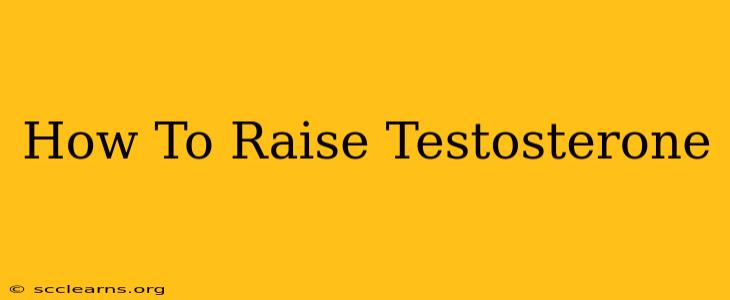Low testosterone can significantly impact your overall well-being, affecting everything from energy levels and muscle mass to libido and mood. While medical intervention might be necessary in some cases, many men can effectively raise their testosterone levels naturally through lifestyle changes. This comprehensive guide explores effective strategies to boost your T naturally.
Understanding Testosterone and its Importance
Before delving into methods to increase testosterone, it's crucial to understand its role. Testosterone is a primary male sex hormone responsible for:
- Muscle growth and strength: Testosterone plays a vital role in building and maintaining muscle mass.
- Increased energy levels: Sufficient testosterone contributes to higher energy levels and reduced fatigue.
- Enhanced libido and sexual function: Testosterone is essential for healthy sexual desire and function.
- Improved bone density: It contributes to stronger bones and reduces the risk of osteoporosis.
- Mood regulation: Testosterone influences mood, reducing symptoms of depression and anxiety.
Low testosterone, or hypogonadism, can lead to several adverse effects, including decreased libido, erectile dysfunction, fatigue, weight gain, and mood swings. It's essential to consult your doctor if you suspect low testosterone levels. They can perform blood tests to confirm a diagnosis and rule out underlying medical conditions.
Natural Ways to Boost Testosterone Levels
Fortunately, numerous lifestyle adjustments can significantly impact your testosterone levels. These natural approaches are generally safe and can yield impressive results when consistently implemented:
1. Optimize Your Diet
Nutrition plays a pivotal role in hormone production. Focus on a balanced diet rich in:
- Lean protein: Essential for muscle growth and testosterone synthesis. Include sources like chicken, fish, beef, and beans.
- Healthy fats: Crucial for hormone production. Opt for sources like avocados, nuts, seeds, and olive oil.
- Complex carbohydrates: Provide sustained energy levels. Choose whole grains, fruits, and vegetables.
- Zinc and magnesium: These minerals are essential for testosterone production. Good sources include oysters, pumpkin seeds, and dark chocolate.
- Vitamin D: Studies suggest a correlation between vitamin D levels and testosterone. Sunlight exposure and supplementation can help.
2. Exercise Regularly
Regular physical activity, particularly resistance training, is highly effective in boosting testosterone. Focus on compound exercises that work multiple muscle groups simultaneously, such as:
- Squats: A powerful exercise for overall strength and testosterone production.
- Deadlifts: Another excellent compound exercise for building muscle mass and boosting testosterone.
- Bench press: A fundamental exercise for upper body strength.
- Overhead press: Works the shoulders and upper body, contributing to testosterone production.
Aim for at least 3-4 sessions of resistance training per week. Incorporate cardiovascular exercise as well for overall health and well-being.
3. Prioritize Sleep
Sleep deprivation significantly impacts testosterone production. Aim for 7-9 hours of quality sleep per night. Establish a regular sleep schedule, create a relaxing bedtime routine, and optimize your sleep environment for a restful night's sleep.
4. Manage Stress
Chronic stress elevates cortisol levels, which can suppress testosterone production. Incorporate stress-reducing techniques into your daily routine, such as:
- Yoga: Helps reduce stress and improve overall well-being.
- Meditation: A powerful tool for stress management.
- Spending time in nature: Can have a calming effect and reduce stress levels.
5. Limit Alcohol Consumption
Excessive alcohol consumption can negatively impact testosterone production. Moderate your alcohol intake to minimize its potential detrimental effects.
6. Consider Supplements (With Caution)
Some supplements are marketed to boost testosterone, but their effectiveness varies. Always consult your doctor before taking any supplements, especially if you have underlying health conditions. Some commonly discussed supplements include D-aspartic acid and fenugreek.
When to Seek Medical Attention
While lifestyle changes can significantly impact testosterone levels, it's crucial to seek medical advice if you suspect low testosterone. Your doctor can perform blood tests to confirm a diagnosis and recommend appropriate treatment options. Low testosterone can be a symptom of underlying medical conditions, so a proper diagnosis is crucial.
This guide provides a comprehensive overview of natural ways to potentially increase your testosterone levels. Remember that consistency is key. By implementing these strategies and maintaining a healthy lifestyle, you can significantly improve your chances of naturally boosting your testosterone and enhancing your overall well-being. However, always consult with a healthcare professional before making significant dietary or lifestyle changes, especially if you have pre-existing health conditions.

